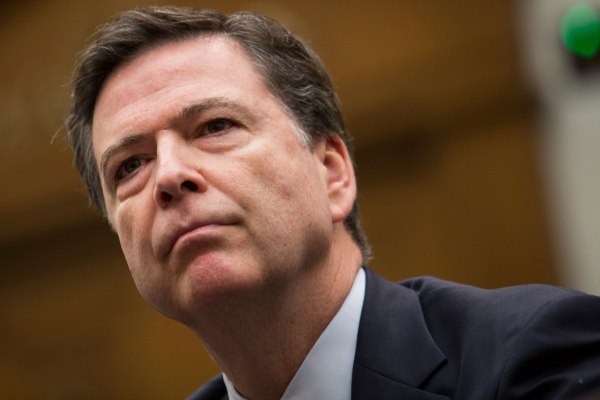Today, the former FBI director who ran afoul of President Trump appeared before the Senate Intelligence Committee in its ongoing investigation into Russian interference in the 2016 U.S. presidential election. It was James Comey’s first appearance since he was fired from his role as the director of the FBI.
Providing a useful framework for the hearing, Comey issued a written opening statement a day before his testimony, laying out the facts of his meetings with President Trump and a timeline of those events. Comey’s collected, at times self-deprecating, style and his talent at composing his thoughts clearly under pressure means that the hearing was strewn with small, remarkable moments.
Here are some highlights from today’s open hearing:
- “It confused me when I saw on television that the president said he actually fired me because of the Russia investigation,” Comey said of Trump’s motives for his termination.
- After being fired by Trump, Comey himself leaked his memo about his dinner with Trump to the press through Daniel Richman, a friend at Columbia University. Comey noted that he wanted to create interest in a special counsel.
- “Lordy, I hope there are tapes,” Comey said of the possibility that Trump recorded their interactions.
- On his decision to keep detailed notes on each meeting with the president: “I was honestly concerned that he might lie about the nature of the meeting.”
- Asked if the president’s actions amount to obstruction of justice: “I don’t know. That’s Bob Mueller’s job to sort that out.” After Comey’s firing, Mueller was named to a special counsel role in which he will investigate the possible connection between the Trump campaign and Russia.
- Comey felt “queasy” when former Attorney General Loretta Lynch directed him to call the email investigation into Hillary Clinton a “matter” instead of an investigation.
- In response to the question “Do you believe Donald Trump colluded with Russia?” Comey says that he should not answer that question in a hearing open to the public, though clarifies he didn’t mean to imply anything “nefarious.”
- Comey suggested that Vice President Pence was aware of concerns around former National Security Adviser Michael Flynn.
- Comey will provide his notes and memos to the Senate committee.
- Some lines of questioning suggested that Jeff Sessions may have acted improperly if he was involved in Comey’s termination after recusing himself from matters around Russia.
- Comey revealed that he had expressed his concerns about Trump to Deputy Attorney General Rod Rosenstein. Rosenstein, who was aware that Comey was about to be fired, authored the memo that the White House used in the firing.
- Comey again stressed the gravity of Russia’s involvement in the U.S. political process, calling it “about as un-fake” as it gets.
- Comey declined to answer a number of questions in a hearing open to the public, and presumably will save many of those answers for the closed session to follow.
While these revelations are noteworthy, Comey spent the bulk of his time laying out his timeline of events and dismissing some of President Trump’s claims as “lies, plain and simple.” Coming from a former director of the FBI with a distinguished career and bipartisan respect, that alone might be the most remarkable takeaway from Comey’s historic testimony.
